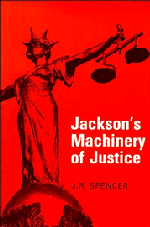Book contents
- Frontmatter
- Contents
- Acknowledgements
- List of figures
- List of tables
- Preface
- Preface to the first edition of ‘The Machinery of Justice in England’
- Abbreviations
- I Historical introduction
- II Civil jurisdiction
- III Tribunals
- IV Criminal jurisdiction
- V The personnel of the law
- 27 Solicitors
- 28 Barristers
- 29 Legal education
- 30 Should the profession continue to be divided into barristers and solicitors?
- 31 Judges
- 32 Juries
- 33 Lay justices and stipendiary magistrates
- 34 The administration of the courts
- VI The European dimension
- VII The cost of the law
- VIII Law Reform
- Appendix A The Report of the Civil Justice Review
- Table of Cases cited
- Table of Statutes cited
- Table of Stationery Office publications cited
- Index
28 - Barristers
Published online by Cambridge University Press: 10 January 2011
- Frontmatter
- Contents
- Acknowledgements
- List of figures
- List of tables
- Preface
- Preface to the first edition of ‘The Machinery of Justice in England’
- Abbreviations
- I Historical introduction
- II Civil jurisdiction
- III Tribunals
- IV Criminal jurisdiction
- V The personnel of the law
- 27 Solicitors
- 28 Barristers
- 29 Legal education
- 30 Should the profession continue to be divided into barristers and solicitors?
- 31 Judges
- 32 Juries
- 33 Lay justices and stipendiary magistrates
- 34 The administration of the courts
- VI The European dimension
- VII The cost of the law
- VIII Law Reform
- Appendix A The Report of the Civil Justice Review
- Table of Cases cited
- Table of Statutes cited
- Table of Stationery Office publications cited
- Index
Summary
Barristers, known collectively as ‘the Bar’ and also collectively and individually as ‘counsel’, have a long history as a profession. The distinction between attorneys and those who pleaded in court can be seen under Edward I, but the settlement of the Bar as a definite organisation probably took place later. Fortescue, writing in the fifteenth century, described the Inns of Court as well-established institutions. Lincoln's Inn, The Middle Temple, The Inner Temple, and Gray's Inn, together with lesser Inns that have disappeared, existed as bodies with an organisation much like Oxford and Cambridge colleges. The governing body was the Benchers, who were senior members who themselves filled any vacancies that occurred. One of the functions of the Inns was legal education, conducted by lectures and arguments. In rank below the Benchers came the Readers, who delivered lectures which were followed by arguments in which the next rank, the Utter-barristers, disputed with the Readers. The lowest rank of learners were the Inner-barristers. In the more formal arguments, called moots, the Benchers acted as judges and the cases were argued by two Utter-barristers and two Inner-barristers. It was a tense training which tended to keep the narrow requirements of procedure well to the fore. The other function of the Inn was the ‘call to the Bar’.
- Type
- Chapter
- Information
- Jackson's Machinery of Justice , pp. 336 - 344Publisher: Cambridge University PressPrint publication year: 1989

